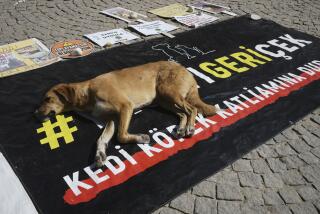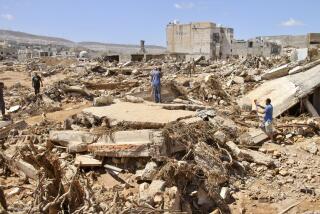As Buildings Fell in Turkey, So Did Illusions : Earthquake: Disaster laid bare massive corruption. Many now try to fight city hall.
- Share via
ISTANBUL, Turkey — Due to a production error, this story did not appear in its entirety in some Saturday editions. Also, a portion of a story about how Turkey’s earthquake exposed corruption between builders and politicians appeared in some Saturday editions. The entire Turkey story is printed today, beginning on A1.
*
Sinan Cetinkaya still remembers the delights of moving day: the elegant moldings in his $70,000 three-bedroom apartment. The parquet floors. The built-in barbecue grill on the balcony.
His new address, the Gunduz building, was a status symbol for the young businessman, part of the first generation of his family to leave its provincial roots, attend college and join Turkey’s booming urban economy.
But in the monstrous earthquake of Aug. 17, the seven-story building collapsed--along with all of Cetinkaya’s illusions about his country and its leaders. Tearing into the rubble in search of his mother, he was shocked to find one sign after another of shoddy construction.
The magnitude 7.4 quake, which killed at least 16,000 people, has shaken Turks out of their traditional fatalism and deference to what they call devlet baba, or “father state.” Cetinkaya is one of thousands who have joined a movement--both legal and civic--to hold builders and public officials accountable for the substandard construction that is blamed for the staggering toll.
From a society that has little faith in its legal system, the flood of litigation is extremely unusual and appears to reflect more the angry national mood than any real hope of winning in court.
“I am suing not because I hope to gain personally,” the 32-year-old said, his eyes still clouded with the pain of finding his mother’s crumpled, lifeless body. “I am doing this to cause a reaction in society, a reaction the government feels.”
Like no other event, the quake has laid bare the corrupt realities of modern Turkey. And it has focused civic ire on politicians who had turned a blind eye to building code violations in exchange for money or votes, and contractors who had turned the country’s urban construction boom into an unbridled greed-a-thon.
It also has shattered the popular image of a state whose politicians, bureaucrats, army and police commanders projected themselves as all-powerful and all-caring--and demanded total allegiance in return.
Galvanized by the failure of any state institution to react swiftly to the emergency, ordinary Turks surprised themselves with a mass mobilization of private rescue and relief. Tusiad, the country’s leading business association, estimates that 10 million of Turkey’s 14 million households helped in some way.
Activists Organize to Try to Get Justice
Aiming to channel that energy into fundamental changes, hundreds of lawyers, architects and civil engineers are working free to help quake victims seek damages and bring the negligent to justice. At least 19 contractors have been arrested in what one volunteer lawyer calls “a legal war” against corruption.
Independent professional groups and the media are clamoring for reforms that would prevent faulty reconstruction and prepare Turkey for the next big quake, which geologists predict will likely hit the same densely populated industrial region within a few decades.
But the grass-roots activists face an uphill battle. The central government in Ankara, after its initial outcry against “mass murder” by politically powerful contractors, has given little support to the private crusade to bring them to justice. And while promising an overhaul of construction practices and housing policies, officials have ignored some of the newly assertive groups demanding a voice in the process.
“The state has degenerated into a machine that merely runs for itself,” said Ishak Alaton, whose multimillion-dollar Turkish conglomerate, Alarko, does high-quality construction. “It will require a drastic change in mentality for the state to realize that it exists to serve the people.”
Building a Metaphor for How System Works
The wreckage of the Gunduz building offers a case study of the negligence and greed that conspired with nature to crush so many lives. It also illustrates the long odds against citizen efforts to make the state more accountable.
Cetinkaya, a tall, successful auto and insurance salesman with blow-dried brown hair, moved with his mother into their spacious, second-floor Gunduz apartment in Istanbul’s Avcilar district in 1994.
Elbeyi Gunduz, the builder, had worked for years in Germany. He then returned home in the mid-1980s to plow his savings into an expanding enterprise that built buildings and sold construction materials, refrigerators and washing machines, neighbors said.
With his late-model gray Mercedes-Benz 200E sedan, the short, plump Gunduz was rich by the standards of Avcilar, a bustling, mostly working-class suburb. “Because he was successful, people thought he was a good builder,” Cetinkaya said.
On the night of the quake, Cetinkaya was up late at a friend’s house in the neighborhood, drinking and talking business. The building began to sway. Cetinkaya raced home but initially thought he had taken the wrong road; he couldn’t see his house.
Then it hit him. “There was no house,” he recalled. The Gunduz was a mountain of bricks, the steel supports twisted like spaghetti, the 28 apartments crushed between floors stacked like layers of pastry. At least 13 people were dead.
Among those who joined Cetinkaya in the frantic digging were volunteers with engineering expertise. They began to point out the building’s irregularities: The iron support bars were too thin. The concrete hadn’t properly settled.
Weeping and outraged, the businessman and 20 other relatives of the dead marched across the road to Gunduz’s home. “Why are you playing with people’s lives?” they yelled. “Was the money worth it?”
But Gunduz had fled.
“We were lucky we didn’t find him,” Cetinkaya said. “We would have done terrible things to him.”
Gunduz isn’t the only builder in hiding.
According to construction specialists, virtually every one of the 21,390 apartment blocks that collapsed in the quake was built by contractors who skimped on materials, added extra stories, avoided soil tests and ignored earthquake-proof requirements--while municipal officials charged with enforcement looked the other way.
The Turkish Architects and Engineers Assn. has estimated that more than half the country’s residential buildings fail to comply with building codes, even though 98% of the population lives near seismic fault lines. In Istanbul, where the population has been growing by nearly half a million a year, the noncompliance rate was put at 65%.
Cetinkaya got an early warning about cheating at the Gunduz building before he moved in. The builder had obtained a permit for six floors but added a seventh while it was under construction.
When the home buyers demanded an explanation, “the builder told us he would get permission and make it legal as soon as possible,” Cetinkaya recalled.
In fact, the seventh floor was never legalized. According to real estate records, on Feb. 4, 1993, Gunduz paid a fine equal to $2,177 to the city, which ordered the floor demolished. But it remained, and buyers moved into the illegally added apartments.
Orhan Kilic, an Istanbul lawyer, said mayors often assessed fines on such illegal construction. But few tried to stop the unlawful building. The honest ones, he says, prefer to keep collecting fines. The dishonest ones pocket bribes that, other experts say, range up to $100,000 for overlooking buildings like the Gunduz.
Also, few mayors are willing to alienate voters in fast-growing places such as Avcilar by tearing down their homes. “Mayors are always frightened about the next election,” Kilic said. Others are intimidated by threats of violence from owners desperate to protect their property.
On a recent afternoon, Kilic and five other lawyers in short-sleeved shirts and khakis packed into two cars with Gulumser Deliibrahimoglu, a court-appointed architect, and drove from one quake-crushed building to another in Avcilar. She was examining some of the 500 complaints filed in Avcilar with the lawyers, volunteers mobilized by the Istanbul Bar Assn.
The last stop on their tour was the Gunduz, a gaping cavity filled with torn mattresses, bricks and snapped concrete columns ribbed with corroding metal rods.
“You can see 30 centimeters’ space between the rods. It should be less,” Deliibrahimoglu said, scribbling on a clipboard. The columns, she explained, were too weak to hold up the building.
Tahsin Salihoglu, the mayor of Avcilar from 1992 until this spring, is a target of the impending lawsuits, along with Gunduz and other builders. Salihoglu shrugged off responsibility. His eight building inspectors were simply overwhelmed by a housing boom that brought the district’s population to 350,000.
“None of the municipalities check the quality of the buildings,” the ex-mayor said in an interview, pulling on a cigarette in a long black cigarette holder. “They should,” he added, but municipal salaries are too low to attract enough qualified inspectors.
Salihoglu and Gunduz are exhibits A and B for the cozy ties between builders and the Turkish government. Many politicians, including members of parliament, got rich in construction before being elected to positions that allow them to oversee the corruption-ridden industry--and continue profiting from it through bribery.
Salihoglu built three buildings in the 1980s. He admits having diluted concrete with sea sand--illegal for building because of its corrosive salt content--to reduce costs. “Most buildings were made with sea sand” at the time, he said, pleading ignorance. “If I were to build now, I’d use better material.”
Gunduz enjoyed a close relationship with the ex-mayor’s party, Motherland, during its seven-year rule in Avcilar. The builder’s son, Senol, was a member of Motherland’s municipal governing board, and the family was active in its electoral campaigns. In 1997, Senol Gunduz won a $46,000 public works contract to build sidewalks.
The ex-mayor insisted that the Gunduz family was not favored because of its political activity. “They’re zero. They’re little,” he said.
Some neighbors share the belief that Elbeyi Gunduz was more ignorant than corrupt. They point out that the builder’s grandson lived in the Gunduz building and was seriously injured in the quake. The builder’s own apartment, in another building, was badly damaged.
A judge might agree. A token handful of builders were arrested after each of Turkey’s three previous quakes on charges of negligence leading to death, but just four were convicted; they were given prison sentences ranging from 2 1/2 to three years. Courts freed the others, arguing that their professed lack of experience minimized any liability for fatal construction errors.
Punishing civil servants is even more difficult under Turkish law. Courts are compromised by partisan appointments. Prosecutors in some quake-damaged towns express the view--challenged by independent lawyers--that mayors and local inspectors cannot be held liable for nonenforcement of building codes.
Yucel Sayman, president of the Istanbul Bar Assn., said the central government’s Public Works Ministry is bulldozing away the rubble of some buildings before volunteer teams can gather incriminating debris. “While we’re discussing the legal process, the culprits are destroying evidence and laughing behind our backs,” he said.
Officials in Ankara, the capital, acknowledge that they aren’t pushing hard for criminal trials, saying the responsibility for poor construction is too blurred. One official warned that the legal system would be paralyzed if every family sought recompense for personal loss.
“We cannot remedy all the mistakes of the past, but we can derive lessons for the future,” Prime Minister Bulent Ecevit said on television.
Ecevit’s government has taken over land-use policy in the stricken areas until it can write new nationwide regulations for construction that will include mandatory insurance. It has asked U.S. and Japanese seismologists to help decide which areas are unsafe for reconstruction and is considering relocating the entire quake-wrecked city of Adapazari, home to 350,000 people.
The Cabinet also decided last week to create special rescue teams, write a national disaster plan and set up an emergency communications network to replace the system that broke down between Ankara and the provinces in the wake of the quake.
Disillusioned by its initial response to the disaster, ordinary Turks say they are not about to let their government backslide on such promises. Much will depend, the government’s critics say, on its responsiveness to pressure from civic groups energized by the quake.
So far, the record is mixed.
Ankara has ignored demands by the architects and engineers’ association, a prestigious group removed from partisan politics, to play a role in future building inspections. The rigidly pro-secular government has frozen the bank accounts of private Islamist-run charities that rushed to aid quake victims, and it ordered the weeklong closure of a private television station that criticized its handling of the disaster.
On the other hand, Ecevit and other leaders have voiced a degree of self-criticism rarely heard in Turkish politics; one minister remarked that the quake was “a declaration of bankruptcy for the Turkish political and administrative system.”
When citizens revolted against proposed new taxes to pay for quake damage, Ecevit backed down, saying he would first let spontaneous relief efforts run their course.
“This disaster will bring slightly better government than before, if only because it happened in and around Istanbul, where the media, the industry and the wealth are concentrated,” said Turgut Oztas, a geologist at Istanbul Technical University. “People here are demanding answers.”
People like Sinan Cetinkaya.
The businessman’s inquiry into the Gunduz building collapse is one of the few distractions in his life. As he mourns his mother, his lawsuit gives him hope that he can help defeat Turkey’s scourges of official corruption and negligence.
But Cetinkaya blames himself too.
“The earthquake caught us so unready, so unaware,” he said. “We didn’t know the building had problems” but should have checked.
“It’s not just one person who’s guilty. We’re all guilty.”
More to Read
Sign up for Essential California
The most important California stories and recommendations in your inbox every morning.
You may occasionally receive promotional content from the Los Angeles Times.










